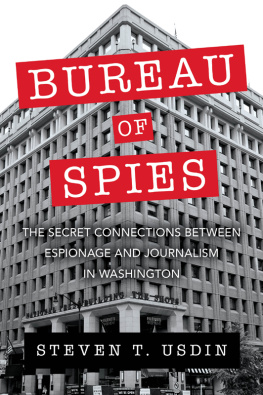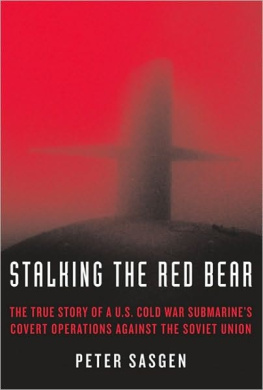S. Uranov - Espionage: Foreign Secret Service Recruiting Methods Against the Soviet Union
Here you can read online S. Uranov - Espionage: Foreign Secret Service Recruiting Methods Against the Soviet Union full text of the book (entire story) in english for free. Download pdf and epub, get meaning, cover and reviews about this ebook. City: New York, year: 1937, publisher: International Publishers, genre: History. Description of the work, (preface) as well as reviews are available. Best literature library LitArk.com created for fans of good reading and offers a wide selection of genres:
Romance novel
Science fiction
Adventure
Detective
Science
History
Home and family
Prose
Art
Politics
Computer
Non-fiction
Religion
Business
Children
Humor
Choose a favorite category and find really read worthwhile books. Enjoy immersion in the world of imagination, feel the emotions of the characters or learn something new for yourself, make an fascinating discovery.

Espionage: Foreign Secret Service Recruiting Methods Against the Soviet Union: summary, description and annotation
We offer to read an annotation, description, summary or preface (depends on what the author of the book "Espionage: Foreign Secret Service Recruiting Methods Against the Soviet Union" wrote himself). If you haven't found the necessary information about the book — write in the comments, we will try to find it.
S. Uranov: author's other books
Who wrote Espionage: Foreign Secret Service Recruiting Methods Against the Soviet Union? Find out the surname, the name of the author of the book and a list of all author's works by series.
Espionage: Foreign Secret Service Recruiting Methods Against the Soviet Union — read online for free the complete book (whole text) full work
Below is the text of the book, divided by pages. System saving the place of the last page read, allows you to conveniently read the book "Espionage: Foreign Secret Service Recruiting Methods Against the Soviet Union" online for free, without having to search again every time where you left off. Put a bookmark, and you can go to the page where you finished reading at any time.
Font size:
Interval:
Bookmark:
This pamphlet may be obtained in quantities for distribution by organizations or individuals at the following prices:
Single copies.... $ .10
Three copies.....25
Eight copies......50
Twenty copies... 1.00
Published by International Publishers, Inc.
381 Fourth Ave., new York
July, 1937
Printed in the U.S.A.

Espionage, wrecking and acts of diversion are tried weapons in the arsenal of bourgeois governments. These weapons are not only used in the struggle against potential enemies, but also against so-called friendly countries.
The enemies of the Soviet Union do not limit themselves to sending spies into the country and getting their people into important centers; they exert every effort to recruit dubious and unstable citizens of the Soviet Union for their espionage system. They strive to draw them into their web of espionage, to push them into the path of betraying their country and for this purpose resort to blackmail, bribery, deception and threats in order to compel them to serve the enemies of the Soviet Union. It must be borne in mind that the spy, diversionist and wrecker is dangerous because, disguising himself as "our " man, he penetrates into our ranks and take s advantage of our complacency and credulity in order to carry out the orders of his roasters, to stab us in the back, to cause the death of numbers of Soviet citizens, to cause disasters and facilitate the victory of our enemies.
In order to hinder the enemy in his work, to prevent him from discovering our state secrets and from damaging our defenses and socialist construction, we must thoroughly learn the lessons that have been recently taught us, we must declare war against credulity and complacency which leave loopholes through which our enemies can penetrate into our midst. We must expose the cunning and devious paths by which foreign secret services recruit for their espionage system people who are not bad in themselves, who do not want to become traitors to their country, but who become spies because they lack vigilance and are unable to discern the enemy and his despicable designs beneath the mask of friendship and pretense.
Foreign secret services strive by various means to send their trained spies into other countries. These spies undergo a very thorough training before they are sent on espionage work to the particular country in which the secret service is interested.
During the World War there was the well-known case of the British agent "DN-27" who was trained at a school for spies in Devonshire. He went to Germany long before the war broke out, joined the army there as a volunteer and soon after obtained a commission as a lieutenant. Speaking German, English and French fluently, he was transferred to the Headquarters Staff of Prince Rupprecht of Bavaria who was in command of the Bavarian Corps near Lille. During the whole period of the war "DN-27" was in communication with the British Intelligence Service. Even in 1918, when the German Secret Service had managed to secure a list of the Allies' secret service agents, this officer, who at that time was already a colonel in command of a German regiment, still remained undiscovered. He revealed his identity himself in Spa, where he was sent as a German delegate for the armistice negotiations and openly joined the British delegation.

The sending of spies to at her countries for the purpose of permeating the organism of the state is practised by all foreign secret services. At the same time they also study the inhabitants of neighboring countries for the purpose of singling out those who, under some pretence or other, or by one method or another, can be recruited for espionage work. It is well known that nearly all persons who receive a permit to leave Germany are obliged to present themselves to the Foreign Department of the National-Socialist Party, and the overwhelming majority of these receive instructions to conduct espionage work and also to study the people they come in contact with abroad.
The same system prevails in Japan. The study of citizens of foreign countries is pursued for one purpose onlyto recruit them for espionage work. For example, before the World War, the German Secret Service had a special card index which recorded according to place of residence, occupation and description, all persons marked down as possible recruits for their espionage operations.*
These lists of "candidates" for espionage operations, who very often are the victims of blackmail, are drawn up on various grounds. Primarily, of course, attention is paid to politically unstable and wavering elements, then to people suffering from various weaknesses and vices, drunkards, perverts, people guilty of mishandling government money, embezzlers, etc.
*Before the war the German Secret Service had a list of 47,000 persons living in Russia, Great Britain and France. These people served as a reserve from which spies were recruited. To recruit them for espionage work all sorts of methods of blackmail, bribery, threats and provocation were resorted to, according to the character of the individual concerned.

Possessing these lists of people who are compromised in one way or another, the secret service takes advantage of the visits to foreign countries any of these people may make in order to recruit them for their espionage work. The secret services also send out agents to foreign countries to recruit agents from among the inhabitants of those countries. Spies sent to the Soviet Union undergo very careful training. They are taught to speak the language perfectly, they are compelled to read the Soviet press of the district to which they are to be sent, they are taught radio engineering, and during their course of training are obliged to listen to broadcasts from the Soviet Union. The Polish Secret Service, for example, makes it obligatory for their spies who are undergoing training for operations in the U.S.S.R. to read as "compulsory reading" special "lists of recommended literature" which they must be able to interpret in the spirit of Soviet criticism. These lists include such books as Sholokhov's The Soil Upturned, Furmanov's Chapayev, Panferov's Brusski and Ostrovsky's How the Steel Was Tempered. Recently, Polish spies have been obliged to study the new Soviet Constitution, the history of the Communist Party and material on the Stakhanov movement. They are expected to use Soviet terminology with ease.

Trained in this way, the spy-recruiting agents are sent to the U.S.S.R. as tourists or transit passengers, also they cross the frontier illegally, for the purpose of recruiting people for their espionage work.
Every spy sent to the Soviet Union from capitalist countries tries to acclimatize himself to Soviet conditions as quickly as possible, to acquire the appearance of a Soviet citizen and to obtain a situation. This is made easier in the Soviet Union owing to the absence of unemployment. The spy strives to get into a factory or into a government office, to make acquaintances there and watch carefully for likely recruits for his work. To facilitate his task the spy obtains a false or stolen passport, sometimes even a Communist Party book, and all sorts of certificates and recommendations. He sticks at nothing in order to become legalized. For example, he looks out for a confiding woman, or a well-known Stakhanov girl, the daughter of a worker of long standing, marries her, and so becomes well-known himself in the factory as "so-and-so's husband," or "so-and-so's son-in-law," etc. To disguise himself more thoroughly the spy endeavors to distinguish himself as an "active" worker in social life and as a Stakhanovite, or else resorts to flattery and toadying and even to frequent "marriages" and "divorces" with the view to obtaining the most suitable "partner."
Next pageFont size:
Interval:
Bookmark:
Similar books «Espionage: Foreign Secret Service Recruiting Methods Against the Soviet Union»
Look at similar books to Espionage: Foreign Secret Service Recruiting Methods Against the Soviet Union. We have selected literature similar in name and meaning in the hope of providing readers with more options to find new, interesting, not yet read works.
Discussion, reviews of the book Espionage: Foreign Secret Service Recruiting Methods Against the Soviet Union and just readers' own opinions. Leave your comments, write what you think about the work, its meaning or the main characters. Specify what exactly you liked and what you didn't like, and why you think so.






